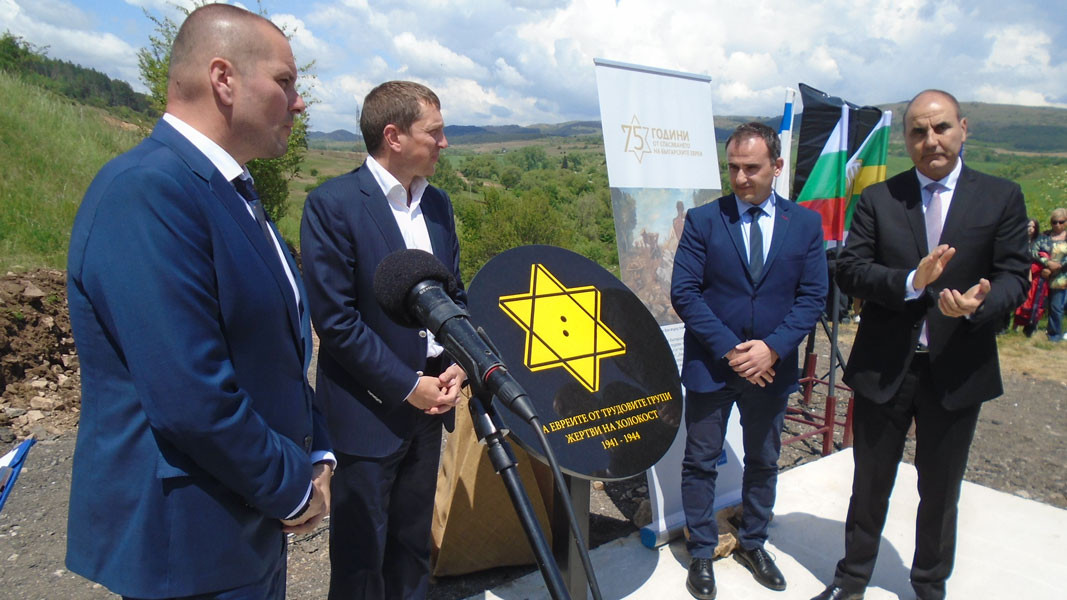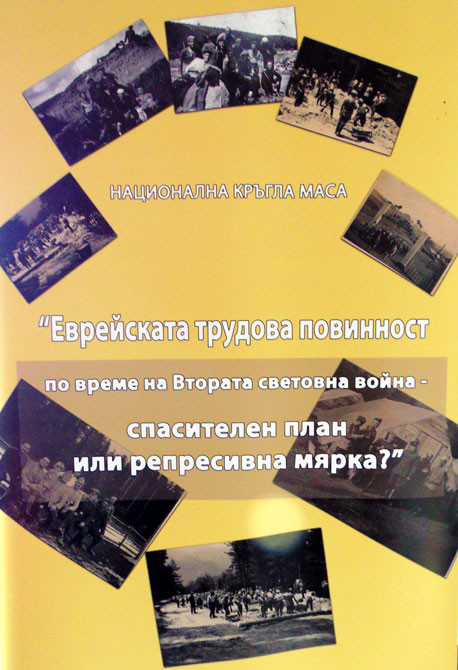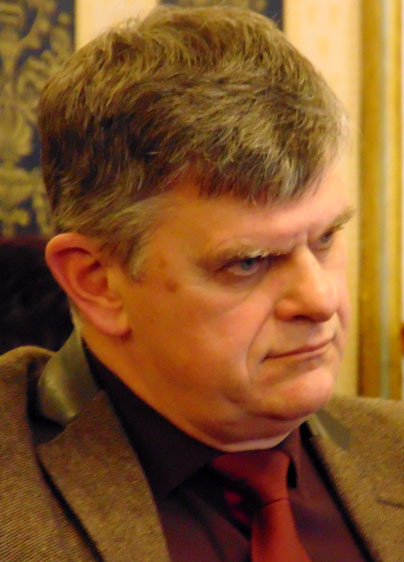At the entrances of some of the Nazi concentration camps, the SS members cynically wrote "Arbeit macht frei" – "Labor makes you free." Without the irony, and with the tears of very bitter realism during World War II in Bulgaria, many Bulgarian Jews were saved, precisely through mobilization in the labour troops of the army. A scientific round table discussion organized by the Institute of Historical Studies of the Bulgarian Academy of Sciences was dedicated to this topic. Due to newly erected monuments in Bulgaria with inscriptions "To Jews from the labour troops who were victims of the Holocaust – 1941-1944", the topic was formulated in a discussion entitled "Jewish Labour Troops during the Second World War – a Rescue Plan or a Repressive Measure".

Bulgaria’s Deputy Minister of Education Peter Nikolov opened the forum by saying that the salvation of Bulgarian Jews did not happen in some epic way, but with the direct efforts of many Bulgarians, each of whom found their own way of doing so.
 “Bulgarians have developed a very clear understanding of what humanity is. What is the attitude to the man next to you, to your neighbour,” pointed out Deputy Minister of Education Petar Nikolov. “Whatever fashion might come from the world, whatever ideology dominates, when it comes to human destinies, Bulgarians tend to be simply humane, to remain philanthropic, to remain sensible. The true dignity of the Bulgarians is their common sense. It is the common sense that has remained in the Bulgarians, whatever has been said in the great politics on the world stage in those years that saved the Bulgarian Jews”.
“Bulgarians have developed a very clear understanding of what humanity is. What is the attitude to the man next to you, to your neighbour,” pointed out Deputy Minister of Education Petar Nikolov. “Whatever fashion might come from the world, whatever ideology dominates, when it comes to human destinies, Bulgarians tend to be simply humane, to remain philanthropic, to remain sensible. The true dignity of the Bulgarians is their common sense. It is the common sense that has remained in the Bulgarians, whatever has been said in the great politics on the world stage in those years that saved the Bulgarian Jews”.
The main report was presented by Prof. Dimitar Nedyalkov from the Military Academy in Sofia. He cited unpublished documents from the Military Archives. According to them, Jewish labor service is entirely built up under the Military Forces Act of 1940, which regulates living and working conditions for everyone mobilized in the service system and the military. In 1944, the total number of Labor Forces was 90,000, of which Jews were just over 12,000 or 15%. Without diminishing the manifestations of anti-Semitism of individuals in the system, the end result is the preservation of the lives of thousands of Bulgarian Jews, who have proven many times through their deeds their great attachment to the Bulgarian state and nation.
 The labor force is the instrument by which Bulgarian Jews were saved – says Prof. Dimitar Nedyalkov. – This effort was systematic. It is not just the fruit of a certain circle of people. We start from the king (Tsar Boris III – ed.) As commander-in-chief, we pass through the commander of the acting army; we pass through the commander of the labor forces and from there down to the command staff until the last labor. The main part of the Bulgarian Jews passed through the Bulgarian barracks in the form of labor forces. This is not just for Bulgarian citizens of Jewish origin. By 1945, nearly half a million Bulgarian citizens had passed through employment. By its very nature, the workplace is an outsourced barracks of a workforce. But I was surprised by the fact that I came across documents in the military archive that were extremely important and were not touched.
The labor force is the instrument by which Bulgarian Jews were saved – says Prof. Dimitar Nedyalkov. – This effort was systematic. It is not just the fruit of a certain circle of people. We start from the king (Tsar Boris III – ed.) As commander-in-chief, we pass through the commander of the acting army; we pass through the commander of the labor forces and from there down to the command staff until the last labor. The main part of the Bulgarian Jews passed through the Bulgarian barracks in the form of labor forces. This is not just for Bulgarian citizens of Jewish origin. By 1945, nearly half a million Bulgarian citizens had passed through employment. By its very nature, the workplace is an outsourced barracks of a workforce. But I was surprised by the fact that I came across documents in the military archive that were extremely important and were not touched.
Even from a cursory reading of the documents, it is clear that the primary concern of the command staff of the labor force is to protect these people in the best possible way. As early as the beginning of 1941, they were personally shown to have equal rights and obligations with everyone else, especially with the Bulgarians in the squad. In spite of the adopted Law on the Protection of the Nation, in honor of the Bulgarian senior officers, personally to the king, through which any change had to take place, the Law on Military Forces was not changed, but was retained in its content since 1940. And all that concerns the service in the army of Bulgarian citizens, some of whom are of Jewish origin, in accordance with the Law on Military Forces.
The salvation of Bulgarian Jews is unique. There is no other country that has thus saved so many people from – I emphasize – the introduced problem of external repression. The Bulgarian army is the main tool for this thing and it is not accidental, Prof. Dimitar Nedyalkov pointed out.
The organization of the Jews in Bulgaria, "Shalom" expressed their objection to the interpretation of the facts and documents quoted by the scholars. Alec Oscar, chairman of Shalom, told the BNR that they were preparing a statement to the chairman of the BAS (Bulgarian Academy of Sciences), urging the Academy to make a clear distinction from the views presented at the national roundtable.
English Rossitsa Petcova
The Getty Museum in Los Angeles, USA, is hosting a webinar today entitled Who Were the Thracians? Professor of Classical and Ancient History Matthew Sears will discuss the Thracian legacy and its influence on ancient Athens. Sears is the author of..
The exhibition "Codes of Identity", which opens today in Sofia, presents ancient Bulgarian lineages that have left a lasting legacy. The venue is the National Archaeological Institute with Museum at the Bulgarian Academy of Sciences (NAIM-BAS) In..
June 11, 2007 - US President George W. Bush Jr. visits Sofia. According to protocol, the press conference he held for the media took place among the exhibits of the National Archaeological Museum. The official lunch for the guest was later held at the..
105 years ago, on November 27, 1919, a treaty was signed in the Parisian suburb of Neuilly-sur-Seine, officially ending Bulgaria's..

+359 2 9336 661
